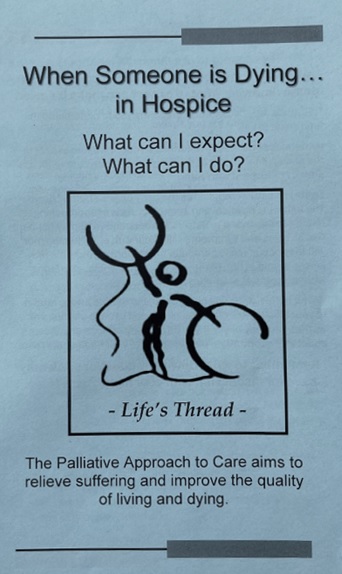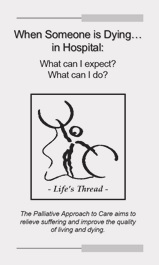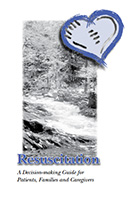Caregiving Guides & Resources
Supports for Individuals and Families
General Resources
- Advance Care Planning Telephone Based Program – HPCO
- Canadian Virtual Hospice – Caregivers CAN: Supporting confident, compassionate care Learning Modules
- https://www.virtualhospice.ca/caregiving/
- Caregiver Education & Resource Modules – HPCO
- How to Prevent and Support Delirium in an Older Adult in Hospital or a Care Home, When You Can’t Visit in Person – RGP
- Printable Symptom Diary – Canadian Virtual Hospice
- RNAO LTC Support Group: Connecting Families
- Short videos teach family caregivers hands-on care skills – Caregiver Exchange Organization
- “The Waiting Room Revolution” – a podcast for caregivers about how to be hopeful and prepared when facing serious illness
- WW Caregiver Connections Facebook Group
Grief Resources
- Grief & Loss/Bereavement Supports – Waterloo and Wellington
- Center for Loss & Life Transition
- My Grief.ca
- Wellness Together Canada
Caregiving Guides and Pamphlets
Advance Care Planning, Waterloo Wellington Learn more>
When Someone is Dying: What Can I Expect? What Can I do?
These guides contain helpful information about what to expect at the end-of-life and may add to what the health care team has already discussed with families. We hope that the guides will help families understand and attend to a loved one’s changing needs and ease any fears or worries.
There is no cost for the guides. The .pdf guides are downloadable in regular and large print formats. For single copies, please download using the links below. For multiple copies, please email us at hpcinfo@hospicewaterloo.ca.
Please note: When printing pamphlets please print on the coloured paper recommended below.
In the Community
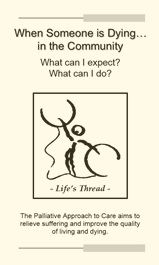
When Someone is Dying in the Community:
What Can I Expect? What Can I do?
–Regular (.pdf)
–Large Print (.pdf)
In Long-Term Care
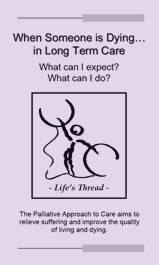
When Someone is Dying in Long-Term Care:
What Can I Expect? What Can I do?
–Regular (.pdf)
–Large Print (.pdf)
In Hospice
When Someone is Dying in Hospice:
What Can I Expect? What Can I do?
–Regular (.pdf)
–Large Print (.pdf)
In Hospital
When Someone is Dying in Hospital:
What Can I Expect? What Can I do?
–Regular (.pdf)
–Large Print (.pdf)
 When Someone Dies – Some Next Steps for Family and Friends
When Someone Dies – Some Next Steps for Family and Friends
The death of a relative or friend is one of the most stressful things that happens in life. If death is sudden or unexpected, the feeling of shock can seem overwhelming. Even when death is expected, it is still difficult to be prepared. While this booklet cannot anticipate every situation, we hope that it will answer some of your questions and help you make necessary arrangements. When Someone Dies – Download
A Caregiver’s Guide: A Handbook About End-Of-Life Care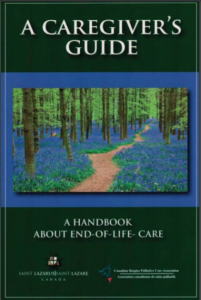
Written especially for family caregivers, this guide, plainly and in language easily understood, presents the medical and nursing information needed to help family caregivers understand the difficulties their loved ones are facing. This informative tool aids family caregivers in becoming valuable members of the palliative care team while, at the same time, providing support physically, emotionally, and spiritually. Caregiver’s Guide – Download
Resuscitation – A Decision-Making Guide for Patients, Families, and Caregivers
This pamphlet provides you with information to answer important questions that you as a patient, family member or caregiver may have about the term “resuscitation”. Resuscitation is the word used to describe the actions that are taken to attempt to bring a person back to life when he/she has stopped breathing or his/her heart has stopped beating. Download
Cardio-Pulmonary Resuscitation (CPR): A Decision Aid for Patients and their Families
Author(s): C. Frank, Principal Investigator
The goal of this pamphlet is to provide information about cardiopulmonary resuscitation (CPR) so you can be adequately prepared to participate in decisions about your care. Download
Pain Intensity Scale Translations (21 Languages)
There is a new booklet available throughout Waterloo Region, Wellington-Dufferin to assist health care providers looking after patients who do not speak English. Translated into 21 languages, the pain scale assessment asks six questions of the patient on a scale of 0 to 10 about their pain. The English is on the back of each of the pages. The pages should be photocopied for ongoing use with a patient to evaluate effectiveness of treatment. Download
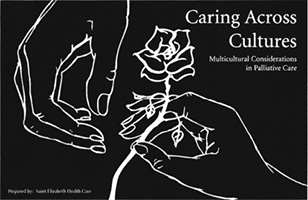 Caring Across Cultures – Multicultural Considerations in Palliative Care
Caring Across Cultures – Multicultural Considerations in Palliative Care
Caring Across Cultures is intended to be a useful resource for caregivers working within a cultural mosaic. It is not…a scientific or academically objective document. Rather it has evolved from a grassroots investigation that has been primarily informed by interviews with community leaders and experts in palliative care. Order Form
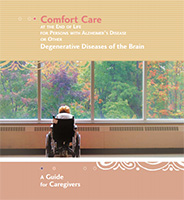 Comfort Care – A Guide for Caregivers
Comfort Care – A Guide for Caregivers
This guide is intended for caregivers of a person with Alzheimer’s Disease or by another type of degenerative disease of the brain, such as Parkinson’s Disease, the effects of multiple strokes or even certain forms of Multiple Sclerosis. Download
Edmonton Symptom Assessment Scale (ESAS-r)
- Administrative Manual
- ESAS-r Tool
- ESAS-r Graph
- ESAS-r Tool Translations Page – 18 Languages in alphabetical order by language. If you are caring for a person and/or family who speaks another language, then this tool will assist you in assessing their physical and psychological needs.

